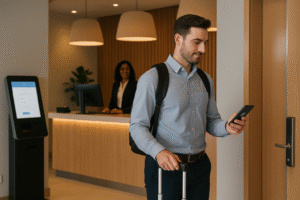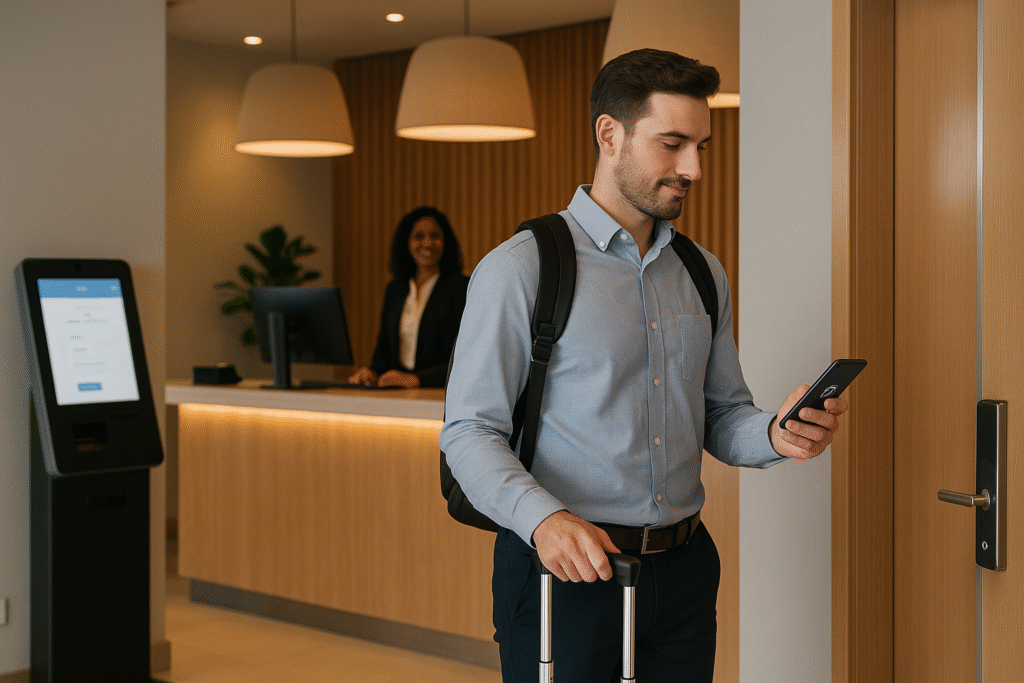
The digital transformation of the hospitality industry isn’t slowing down. Contactless hospitality has become the new benchmark for innovation, offering fast, personalized, and frictionless service at every stage of the guest journey. From booking to check-out, integrated technology is redefining how hotels operate—making every touchpoint more efficient, secure, and human-centered. This shift not only enhances traveler comfort but also streamlines internal operations and reduces operational costs.
What Does a “Contactless Experience” Really Mean?
A contactless experience allows guests to complete every step of their journey—booking, check-in, communication, and payments—without any physical interaction.
While some properties are going fully digital, most are choosing a hybrid model that combines human warmth with smart automation.
For example, a guest can check in online, verify their ID, and receive a digital key directly on their phone before arriving. No waiting in line—just a smooth start that lets staff focus on creating memorable experiences instead.
The Rise of Contactless Tech in Hospitality
During the pandemic, contactless solutions skyrocketed. But far from being a short-term trend, they’ve become the new standard.
Recent studies show that over 50% of travelers want to keep contactless check-in, check-out, and payment options for good.
It’s easy to see why: convenience, speed, and a sense of control.
Nowadays, guests not only expect these options—they’re surprised when they’re not available.
Looking ahead, we’ll see even deeper integration with AI, from facial recognition and predictive maintenance to smart chatbots that handle conversations in real time.
Keys to Building an Effective Contactless Guest Journey

1. Discovery Phase: Digital Booking and Communication
Modern travelers want to book their stays without having to make a call.
That’s why having an online booking engine integrated into your PMS is essential. It should be mobile-friendly, easy to navigate, and able to display rates and availability instantly.
AI-powered chatbots have also become must-haves.
They can answer questions instantly, guide users through the booking process, and boost conversions by up to 30%.
Don’t forget secure online payments—storing payment details in the PMS simplifies automated charges during the stay.
2. Before Arrival: Proactive Communication and Digital Check-In
A confirmation email or message sent right after booking helps ease the guest’s mind.
Collecting their preferred communication channel (WhatsApp, SMS, or email) allows you to send automatic reminders and updates.
Digital check-in is one of the most appreciated features—it lets guests verify their ID, fill out forms, and even upgrade rooms before arrival.
Adding a digital welcome kit with Wi-Fi info, parking details, and services makes the experience even smoother.
3. During the Stay: Autonomy, Efficiency, and Instant Support
Once they’ve checked in, guests expect to communicate easily and solve problems without heading to the front desk.
Hotels can support this with:
- Unified messaging platforms (WhatsApp, SMS, OTA chat)
- Digital room service requests via QR codes or apps
- Digital keys that replace physical cards and reduce costs
- Self-service kiosks in the lobby for quick check-in/out
- These tools improve satisfaction while reducing staff workload.
4. After the Stay: Keep the Connection Alive
The contactless journey doesn’t end at check-out.
Sending digital invoices and automated surveys helps build loyalty and gather feedback.
By integrating these actions into your PMS or CRM, you can easily manage reviews on platforms like Google or TripAdvisor and strengthen your online reputation.
The Foundation: Integrated Technology
Behind every seamless guest experience lies a connected tech ecosystem.
The PMS (Property Management System) is the heart of it all—centralizing information and syncing tools like booking engines, digital keys, CRMs, messaging, and payment solutions.
When everything’s integrated properly, operations run smoother—and guests leave happier.
Real Case: How Spanish Hotels Automated Operations and Elevated the Guest Experience
Across Spain, several independent brands have embraced digital transformation to streamline daily operations and enhance guest satisfaction. Properties such as Hotel Gran Bilbao, Hotel Ciudad de Burgos, and Kora Living integrated their PMS with online check-in tools and AI-powered chatbots, automating up to 90% of guest interactions and increasing digital check-ins from 20% to over 60%. These changes not only reduced administrative workload but also allowed teams to dedicate more time to personalized service and upselling opportunities. Similarly, Valentín Hotel Group adopted an AI assistant that handled more than 22,000 conversations and generated over 2,600 booking leads in a single year, demonstrating how contactless hospitality can drive both efficiency and revenue while preserving the human connection that defines great service.
Conclusion: The Future of Hospitality Has Already Arrived
Contactless hospitality doesn’t mean losing the human touch—it means enhancing it.
Automation allows teams to focus on what truly matters: creating memorable experiences.
Integrating technology, optimizing workflows, and prioritizing guest comfort are now the keys to standing out in a highly competitive market.
Those who understand this in time will always stay one step ahead.


